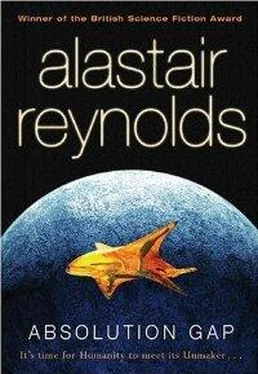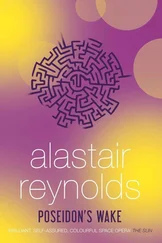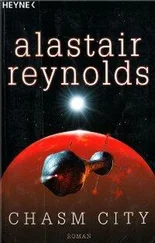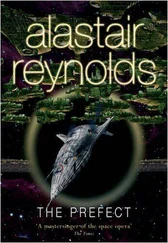Something caught his eye. He looked up, seeing countless sparks zip across the sky. Dozens—no, hundreds—of ships. What was going on?
Then he looked towards the horizon and saw the much larger bulk of the lighthugger, a small but visibly elongated sliver of twinkling iron-grey. The other ships were obviously heading towards it.
Something was up.
Grelier turned from the shuttle, anxious to make his way indoors and find out what was happening. Then he noticed the smudge of red on the end of his cane. He thought he had cleaned it thoroughly before leaving the settlement in the Vi-grid region, but evidently he had been remiss.
Tutting to himself, he wiped the end of the cane against the frost-covered surface of the landing pad, leaving smears of pink.
Then he set off to find the dean, for he had interesting news to deliver.
Orca Cruz saw the two Adventists before the rest of her party. They were at the end of a wide, low-ceilinged corridor, one against each wall, moving towards her with the measured pace of sleepwalkers.
Cruz turned to the three Security Arm officers behind her. “Minimum necessary force,” she said quietly. “Bayonets and stun-prods only. This lot don’t have a flame-gun, and I’d really like to do some questioning.”
The Arm unit nodded in unison. They all knew what Cruz meant by that.
She started towards the Adventists, pushing the sharp blade of her weapon before her. The Adventists had little armour now. Garbled reports from the other elements of the Security Arm—the same messages that had warned her about the flame-throwers—had suggested that they had removed their vacuum suits, but she had not been prepared to believe it until she saw it with her own eye. But they hadn’t discarded the armour entirely: they carried jagged bits, of it in their hands, and had lashed large curved parts to their chests. They still wore their metal glovesand pink-plumed helmets.
She admired the thinking behind their strategy. Once a boarding party had reached this far inside a lighthugger, armour was largely superfluous. Ultras would be very unwilling to deploy energy weapons against boarders even if they knew themselves to be safely distant from vacuum or ship-critical systems. The instinct not to harm their own ship was just too deeply ingrained, even when the ship was under threat of takeover. And aboard a ship like the Nostalgia for Infinity —with every inch of the ship’s fabric wired into the Captain’s nervous system—that instinct was all the stronger. They had all seen what happened when some accident inflicted a wound in the ship; they had all felt the Captain’s pain.
Cruz advanced down the corridor. “Put down your weapons,” she called. “You know you can’t succeed.”
“Put down your weapons,” one of the Adventists replied, chidingly. “We only want your ship. No one will be harmed, and the ship will be returned to you.”
“You could have asked nicely,” Cruz said.
“Would you have been likely to agree?”
“Not very,” she said, after a moment’s reflection.
“Then I think we have nothing else to say to each other.”
Cruz’s party moved forwards to within ten metres of the Adventists. She noticed that one of them was not in fact wearing a gauntlet at all; his hand was artificial. She remembered him: Scorpio had gone to extra pains to make sure the hand did not contain an anti-matter bomb.
“Final warning,” she said.
The other Adventist flung a bladed weapon towards her. It gyred through the air; Cruz threw herself back against the wall and felt the sharp, brief breeze as the weapon whisked past her throat and buried itself in the wall. Another weapon spun through the air; she heard glance against body armour without finding a weak spot.
“All right, game over,” Cruz said. She gestured to her people. “Pacification strength. Take ‘em down.”
They pushed ahead of her, bayonets and snub-nosed stun-prods at the ready. The Adventist with the artificial hand pointed it in Cruz’s direction, like an admonition. It didn’t worry her: Scorpio’s examination had been thorough; the hand couldn’t possibly contain a concealed projectile or beam weapon.
The tip of the index finger came off. It detached from the rest of the finger, but instead of dropping to the ground it just floated there, slowly drifting away from the hand like a spacecraft on a lazy departure.
Cruz watched it, stupidly transfixed. The tip accelerated, travelled ten, twenty centimetres. It approached her party, bobbing slightly, and then yawed to the right as the hand moved, as if still connected to it by an invisible thread.
Which, she realised, it was.
“Monofilament scythe,” she shouted. “Fall back. Fall the fuck back !”
Her party got the message. They retreated from the Adventists even as the tip of the finger began to move in a vertical circle, seemingly of its own volition. The man’s hand was making tiny, effortless movements. The circle widened, the tip of the finger becoming a blurred grey ring a metre wide. In Chasm City, Orca Cruz had seen the grotesque results of scythe weapons. She had seen what happened when people blundered into static scythe defence lines, or moving scythes like the one being demonstrated here. It was never pretty. But what she remembered, more than the screams, more than the hideously sculpted and segregated corpses left behind, was the expression she always saw on the faces of the victims an instant after they’d realised their mistake. It was less fright, less shock, more acute embarrassment: the realisation that they were about to make a terrible, sickening spectacle of themselves.
“Fall back,” she repeated.
“Permission to fire,” one of her party said.
Cruz shook her head. “Not yet,” she said. “Not until we’re cornered.”
The whisking blur of the scythe advanced further down the corridor, emitting a high-pitched quavering note that was almost musical.
Scorpio tried again, shifting his weight as much as he was able, to prise himself away from the wall. He had given up calling for help and had long since stopped paying attention to his own yelps and squeals. The Adventist delegates had not returned, but they were still out there: intermittently, the muffled sounds of battle reached him through the echoing labyrinth of corridors, ducts and elevator shafts. He heard shouts and screams, and very occasionally he heard the basso groan of the ship itself, responding to some niggling internal injury. Nothing that the delegates did—either with their cutting tools or their flamethrowers—could possibly inflict any real harm upon the Captain. The Nostalgia for Infinity had survived a direct attack by one of its own cache weapons, after all. But even a tiny splinter could become an irritation out of all proportion to its physical size.
He thrashed again, feeling savage fire in both shoulders. There: something was beginning to give, wasn’t it? Was it him or the throwing weapons?
He tried again, and blacked out. He came around seconds or possibly minutes later, still pinned to the wall, an unpleasant metallic taste in his mouth. He was still alive, and—pain aside—he didn’t feel much worse than when Seyfarth had stuck him here. He supposed there must have been something in Seyfarth’s boast about not damaging any of his internal organs. But there was no guarantee that Scorpio wouldn’t start bleeding all over the place as soon as the weapons were removed. Why were the Security Arm taking so long to find him?
Twenty soldiers, he thought. That was enough to make trouble, no doubt about it, but they couldn’t possibly hope to take the entire ship. They had known all along that they could not smuggle serious firepower aboard the Nostalgia for Infinity , not in these hair-trigger times. But Seyfarth had struck him as a man who knew what he was doing, very unlikely to have volunteered for a futile suicide mission.
Читать дальше












